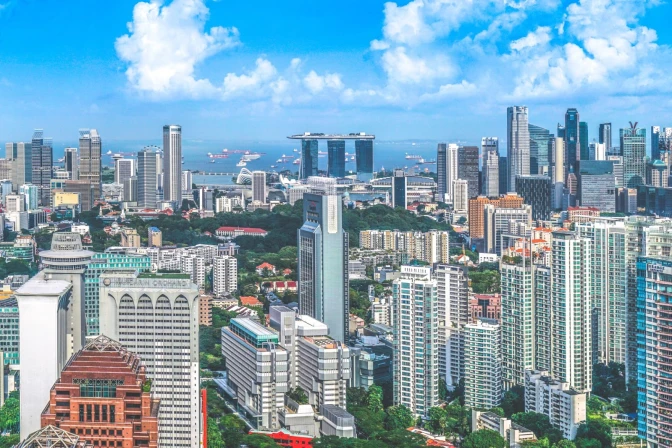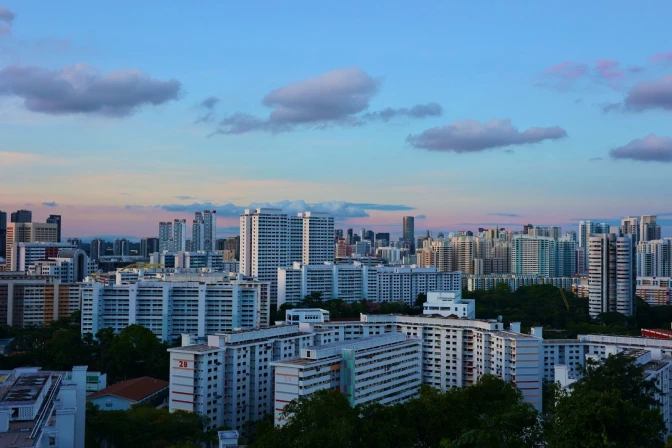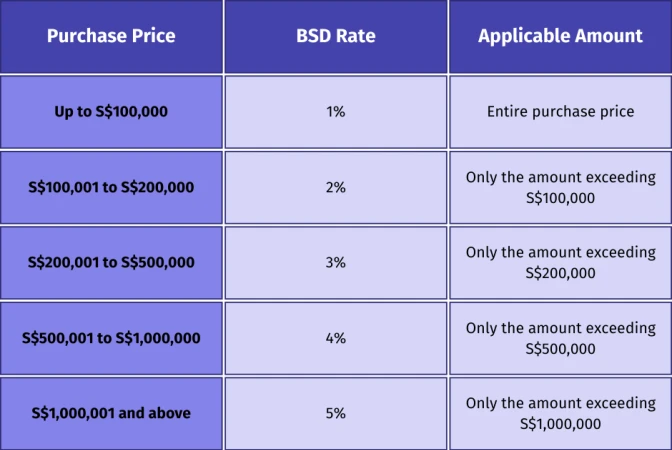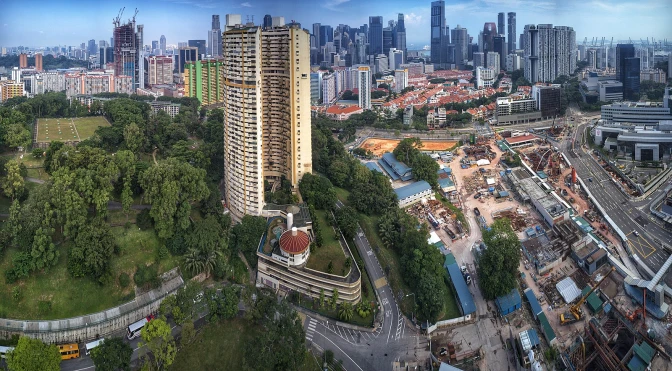Interesting Facts About the Singapore Property Market
Interesting Facts About the Singapore Property Market
The Singapore property market is a captivating and dynamic landscape that has consistently drawn the attention of both local and international investors. With its remarkable blend of tradition and innovation, the Singaporean real estate scene is an intriguing tapestry of sky-high property prices, luxurious living, unique government interventions, and sustainable developments.
In this article, we will delve into some fascinating facts related to the property market in Singapore, shedding light on its unique characteristics and undeniable allure.
An In-Depth Look at Singapore's Property Market

Singapore's Sky-High Real Estate Prices
Unique Factors Contributing to High Property Prices
Singapore is no stranger to the term "sky-high property prices." A perfect storm of factors drives this phenomenon. Limited land availability, high population density, and strict zoning regulations have all played a significant role in pushing property prices to unprecedented levels. The island's thriving economy and status as a global financial hub have intensified demand for real estate.
Statistics and Comparisons with Other Global Cities
To put the soaring property prices in perspective, consider this: Singapore consistently ranks among the top cities with some of the most expensive real estate in the world. It's often compared to other global metropolises like Hong Kong, New York, and London and significantly higher than those of cities like Tokyo, Vancouver, Los Angeles, San Francisco and Paris. This speaks volumes about the desirability and exclusivity of Singapore's property market. On the other hand, Singapore is also consistently ranked among the most expensive cities in the world, ranking (alongside New York) at the top of the EIU's 2022 index of the world's most expensive cities, a position it’s held eight times in the last decade.
HDB Flats: A Pillar of Public Housing

Housing and Development Board (HDB) Flat System
Singapore's Housing and Development Board (HDB) has provided affordable housing for its citizens. It’s the most popular mode of housing residents, with 77% of Singapore’s population living under it. The HDB flat system offers various housing options, catering to diverse needs and budgets. These flats are available for purchase or rent, and they have played a significant role in shaping the nation's housing landscape.
Various Types of HDB Flats and Their Affordability
HDB flats come in various sizes and types, ranging from one-room rental flats to spacious executive apartments. These flats are known for their affordability, making them accessible to various income groups. The HDB's mission is not just to provide housing but to create vibrant communities.
Private Condominiums: Luxurious Living
Opulent Private Condominiums in Singapore
On the other end of the spectrum, Singapore boasts some of the most luxurious private condominiums in the world. These exclusive properties offer residents a taste of opulence and sophistication. With their world-class amenities, breathtaking views, and prime locations, private condominiums are highly sought after by the affluent. In 2022, there was an 8.6% rise in the prices of private homes in Singapore from the preceding year.
Some of the Extravagant Amenities and Features They Offer
Private condominiums spare no expense when it comes to amenities. Imagine living in a residence with a private pool, spa, fitness centre, and even concierge services. The allure of private condominiums lies not only in the elegant living spaces but also in the lifestyle they offer.
The En Bloc Fever
Phenomenon of Collective Property Sales (En Bloc)
En bloc sales, or collective property sales, are a unique aspect of the Singaporean property market. In an en bloc sale, at least 80% of unit owners in a development agree to sell the entire property collectively, most often to another developer. In most cases, the property is quite old and often the plot ratio (the built up space allowable based on the area of the land) may have been increased by the Urban Redevelopment Authority (URA). The URA is responsible for planning and developing Singapore's land use. Because of the usually larger size and more attractive expected selling prices of the redeveloped new property, developers are willing to pay up, and homeowners, particularly those who bought many years earlier, often receive substantial windfalls. These gains are also generally not taxable if the property was sold as a residence.
Government Interventions in the Property Market
Government Policies and Measures to Regulate the Property Market
Singapore's government actively intervenes in the property market to maintain stability and ensure affordability. Measures include cooling measures and regulations on property financing.
In Singapore, Seller's Stamp Duty (SSD) is a tax on residential properties and lands acquired (from February 20, 2010). If sold within the first year, the SSD rate for residential properties is up to 12% of the higher value between the selling price and market value. The rate decreases to 8% in the second year and 4% in the third year, with no SSD payable after the third year. For industrial properties, the SSD rate is 15% in the first year, 10% in the second year, and 5% in the third year, with no SSD applicable after the third year.
Additional Buyer's Stamp Duty (ABSD)
The Additional Buyer's Stamp Duty (ABSD) was introduced to discourage speculation in the residential property market. For citizens and permanent residents (PRs), the ABSD is 0% for the first residential property purchase, 5% for the second purchase, and 10% for subsequent purchases. For foreigners, the ABSD is 30% for any residential property purchase.
This “Additional” cost is on top of the existing Buyer’s Stamp Duty (BSD), which ensures that buyers pay a higher percentage of BSD on more expensive properties, while keeping the tax burden on lower-priced properties relatively lower.

A property bought for S$2,000,000 would therefore pay S$82,000 (1k+2k+9k+20k+50k) in BSD or 4.1% of the purchase price. If a second property for a Singapore citizen it would also attract an ABSD of $100,000 on top of that. If bought by a foreigner, the ABSD would be $600,000 on top of the BSD.
For more information on BSD and ABSD, please visit the website of the Inland Revenue Authority of Singapore (IRAS).
Stata Titles and Airspace Rights
The Concept of Strata Titles and Airspace Rights
Singapore employs a unique system of strata titles that allows residents to own individual units while sharing ownership of common areas. In addition, airspace rights are a fascinating concept where property owners can utilise the space above their homes for various purposes.
Examples of Unique Uses of Airspace Rights in Singapore
Some property owners have used airspace rights creatively, from building rooftop gardens to installing solar panels. These innovative applications contribute to the vibrant cityscape.
Green and Sustainable Developments
Singapore's Commitment to Sustainability in Property Development
Singapore has made a concerted effort to incorporate green and sustainable practices into property development. It has set ambitious targets for reducing carbon emissions and embracing sustainable building designs.
Some Innovative Green Building Projects
In the heart of the city, you'll find buildings like the Oasia Hotel Downtown, which boasts lush greenery on its exterior. The commitment to sustainable architecture and urban planning is evident in many iconic projects across Singapore.
Foreign Ownership and Restrictions
Regulations on Foreign Property Ownership
Singapore imposes restrictions on foreign ownership of residential properties to ensure locals have priority access to housing and to control property speculation. For example, these regulations typically stipulate higher stamp duties or additional taxes for non-resident buyers, deterring excessive foreign investment in the real estate market.
Properties That Foreigners Can Own in Singapore
Foreigners and PRs can freely purchase private condominiums without restrictions.
Foreigners can purchase shophouses and HDB flats if they meet certain eligibility requirements. For shophouses, foreigners must obtain approval from the Urban Redevelopment Authority (URA). For HDB flats, foreigners must have been living in Singapore for at least three years and have obtained a valid HDB Eligibility Letter.
For foreigners, Landed Properties are “Restricted Properties.” These include terrace houses, semi-detached houses, good class bungalows (GCBs) and cluster houses. For such properties, foreign nationals must first obtain permission from the Singapore Land Authority and be assessed on a case-by-case basis. Among the eligibility requirements are being a Singapore PR for at least 5 years, a track record of providing economic contribution in Singapore and employment income taxed in Singapore.
The Property Market's Resilience During Crises
How the Property Market Has Weathered Economic Crises
The Singaporean property market has exhibited resilience during economic downturns. Despite challenges such as the Asian Financial Crisis, SARS, and the Global Financial Crisis, property values have rebounded strongly.
Examples of Its Resilience During Challenging Times
For instance, during the Global Financial Crisis, property prices dipped by 24% but quickly rebounded, making it a relatively stable investment option even in turbulent times. However, past performance is, of course, not indicative of future results!
Futuristic Urban Planning, Smart Cities and a Treasured Heritage
Singapore's Vision for Smart Cities and Urban Development
Singapore has set its sights on becoming a smart city, focusing on technology and innovation to enhance urban living.
Projects and Technologies Contributing to This Vision
Projects like the Punggol Digital District and Smart Nation initiatives are at the forefront of Singapore's journey towards a tech-savvy, sustainable, and highly connected future.
Singapore's rapid urban development and modernisation had already erased much of the city's rich cultural tapestry before the conservation movement took hold in the 1980s to preserve buildings and sites of historical significance. This led to the Conservation Act in 1989, which provided a legal framework for heritage protection.
The Urban Redevelopment Authority (URA) has designated over 100 conservation areas, encompassing a diverse range of architectural styles and historical periods. These areas are protected from demolition and redevelopment, and properties there are often in high demand relative to their very limited supply.
The government has also invested significantly in restoring and revitalising heritage buildings, transforming many into vibrant hubs for culture, commerce and community life.
While heritage conservation is widely supported, it faces many challenges in balancing the preservation of old buildings with the need for modern development.

Conclusion
The Singapore property market is a multifaceted and ever-evolving sector that continues to captivate investors and homeowners alike. From sky-high real estate prices to the juxtaposition of affordable HDB flats and luxurious private condominiums, from government interventions to innovative green developments, Singapore's property market is a study of contrasts and creativity.
While the allure of this market is undeniable, it's essential to remember that property investment is a significant financial decision that should not replace professional advice. Be sure to seek guidance from experts on MoneyFitt to make informed choices. For more valuable insights into the world of property and finance, check out MoneyFitt, your go-to resource for knowledge and guidance on all things financial. Stay informed, stay savvy, and navigate the dynamic Singapore property market with confidence!
